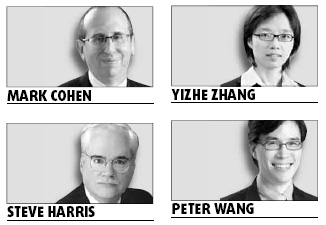

The country's State Administration of Industry and Commerce (SAIC) published two new sets of procedural rules to implement the Chinese Anti-Monopoly Law (AML).
One set of rules deals with procedures for the investigation and handling of cases involving monopoly agreements and abuses of dominant market position. The other specifies procedures for the investigation and handling of administrative monopolies. Both became effective on July 1.
Although it had been ten months since the original AML became effective on Aug 1, 2008, SAIC had not taken any formal or public actions under the AML, despite rumors that it already had received more than 1,000 complaints about anti-competitive conduct.
Promulgation of these new procedural rules might herald the start of AML enforcement by SAIC.
In addition to the procedural rules, in April 2009 SAIC also published for public comments two sets of draft substantive rules - one regarding monopoly agreements and another regarding abuses of dominant market position.
The first set of these new rules, the SAIC Procedural Rules for Investigating and Handling Cases Relating to Monopoly Agreements and Abuse of Dominance Cases (the "SAIC Procedural Rules"), contain important implications for future enforcement.
Jurisdiction

According to the new SAIC Procedural Rules, the SAIC is responsible for investigating and handling cases with nationwide impact, along with other cases in which it might want to exercise discretionary jurisdiction.
Provincial Administrations of Industry and Commerce, or "Provincial AICs," the comparable provincial-level departments under SAIC's supervisory authority, can be authorized to investigate and handle alleged monopolistic conduct occurring solely or principally in their administrative regions.
Compared with the blanket authorization given to Provincial AICs in earlier drafts of the Procedural Rules, the SAIC appears to have moved closer to centralizing its authority with the new rules providing for delegation to Provincial AICs only on a case-by-case basis.
The Rules also specify that, before Provincial AICs can make final decisions regarding suspensions or terminations of investigations or the imposing of administrative penalties, they first must report such decisions to the SAIC.
These provisions appear to give the SAIC the power to supervise AML enforcement by Provincial AICs to ensure nationwide consistency.
Certain ex-officio authority remains with local AICs to conduct investigations, and local AICs can also be called upon to support provincial or national level investigations.
It remains to be seen to what extent the SAIC actually will be able to exercise such supervisory authority in practice, given its currently limited staff resources and the anticipation of a high volume of AML-related complaints.
Formal Investigations
Under the SAIC Procedural Rules, a complaint about a suspected AML violation must be made in writing. The complainant must include basic information about itself and the suspected violator, relevant facts about the suspected AML violations and relevant evidence.
The complainant must state whether the same facts already have been reported to other administrative authorities or filed in the courts. The Rules further require that the submitted evidence must identify and be signed by the persons providing such evidence.
Together, these requirements may, at least in some circumstances, constitute a considerable disincentive to reporting or providing evidence for AML violations.
Only the SAIC and Provincial AICs have the authority to accept such complaints and reporting materials.
Lower-level AICs (e.g., at local levels) that receive such reporting materials must transfer those materials to the appropriate Provincial AIC within five days.
The Provincial AICs will examine and verify the reports and submit to the SAIC their findings and opinions on whether to initiate a formal investigation.
The decision about whether to initiate a formal investigation resides with the SAIC and is entirely within its discretion, subject to delegation of authority to Provincial AICs on a case-by-case basis.
The Rules do not specify the evidentiary burden to be met before the SAIC initiates an investigation.
Nor do they require the SAIC (or its provincial or local branches) to notify complainants about the results of their complaints, including whether or not a formal investigation is opened.
Investigation methods
The SAIC Procedural Rules provide a wide range of methods for the SAIC or Provincial AICs to investigate suspected anti-competitive conduct.
These methods include requesting relevant information and inspecting and copying relevant documents and materials such as certificates, agreements, accounting materials, business letters and electronic data.
The SAIC or investigating Provincial AICs can employ such measures on their own authority without further approval or court orders.
When conducting investigations, AICs can request that companies being investigated, interested parties or any other relevant entities to submit materials in writing within a prescribed time.
Such information can be intrusive, including details about taxes paid, overseas investments, and earnings or dividends from shareholdings.
Although it is difficult to predict the magnitude of SAIC or AIC investigations at this early stage of enforcement, these extensive investigatory powers would appear to indicate that anti-monopoly investigations in China are likely to become as intrusive as those in the United States, Europe or elsewhere.
The authors are lawyers for the US law firm Jones Day. The opinions expressed are their own
(China Daily 09/28/2009 page9)













